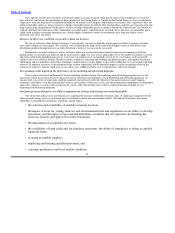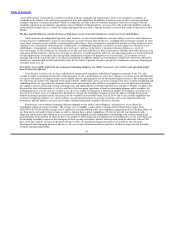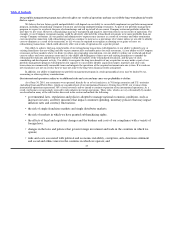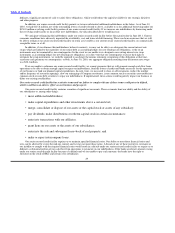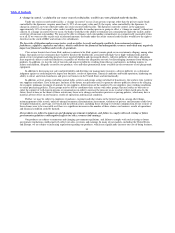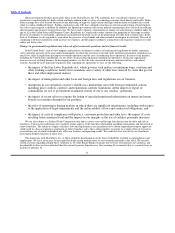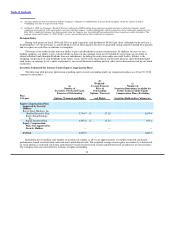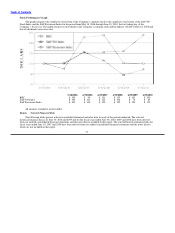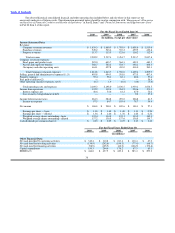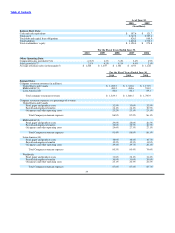Burger King 2010 Annual Report Download - page 33
Download and view the complete annual report
Please find page 33 of the 2010 Burger King annual report below. You can navigate through the pages in the report by either clicking on the pages listed below, or by using the keyword search tool below to find specific information within the annual report.
Table of Contents
Many governmental bodies, particularly those in the United States, the U.K. and Spain, have considered or begun to enact
legislation to regulate high−fat, high−calorie and high−sodium foods as a way of combating concerns about obesity and health. Public
interest groups have also focused attention on the marketing of high−fat, high−calorie and high−sodium foods to children in a stated
effort to combat childhood obesity. Further, regulators in the U.K. have adopted restrictions on television advertising of foods high in
fat, salt or sugar targeted at children. In addition, the Spanish government and certain industry organizations have focused on reducing
advertisements that promote large portion sizes. We have made voluntary commitments to change our advertising to children under the
age of 12 in the United States and European Union. Regulators in Canada and in other countries are proposing to take steps to reduce
the level of exposure to acrylamide, a potential carcinogen that naturally occurs in the preparation of foods such as french fries. In the
State of California, we are required to warn about the presence of acrylamide and other potential carcinogens in our foods. The cost of
complying with these regulations could increase our expenses and the negative publicity arising from such legislative initiatives could
reduce our future sales.
Changes in governmental regulations may adversely affect restaurant operations and our financial results.
In the United States, each of our Company and franchise restaurants is subject to licensing and regulation by health, sanitation,
safety and other agencies in the state and/or municipality in which the restaurant is located. State and local government authorities may
enact laws, rules or regulations that impact restaurant operations and the cost of conducting those operations. In many of our markets,
including the United States and Europe, we are subject to increasing regulation regarding our operations, which may significantly
increase our cost of doing business. In developing markets, we face the risks associated with new and untested laws and judicial
systems. Among the more important regulatory risks regarding our operations we face are the following:
• the impact of the Fair Labor Standards Act, which governs such matters as minimum wage, overtime and
other working conditions, family leave mandates and a variety of other laws enacted by states that govern
these and other employment matters;
• the impact of immigration and other local and foreign laws and regulations on our business;
• disruptions in our operations or price volatility in a market that can result from governmental actions,
including price controls, currency and repatriation controls, limitations on the import or export of
commodities we use or government−mandated closure of our or our vendors’ operations;
• the impact of recent efforts to require the listing of specified nutritional information on menus and menu
boards on consumer demand for our products;
• the risks of operating in foreign markets in which there are significant uncertainties, including with respect
to the application of legal requirements and the enforceability of laws and contractual obligations; and
• the impact of costs of compliance with privacy, consumer protection and other laws, the impact of costs
resulting from consumer fraud and the impact on our margins as the use of cashless payments increases.
We are also subject to a Federal Trade Commission rule and to various state and foreign laws that govern the offer and sale of
franchises. Various state and foreign laws regulate certain aspects of the franchise relationship, including terminations and the refusal to
renew franchises. The failure to comply with these laws and regulations in any jurisdiction or to obtain required government approvals
could result in a ban or temporary suspension on future franchise sales, fines, other penalties or require us to make offers of rescission
or restitution, any of which could adversely affect our business and operating results. We could also face lawsuits by our franchisees
based upon alleged violations of these laws.
The Americans with Disabilities Act, or ADA, prohibits discrimination on the basis of disability in public accommodations and
employment. We have, in the past, been required to make certain modifications to our restaurants pursuant to the ADA. We recently
settled a lawsuit regarding alleged ADA violations in 10 of the Burger King restaurants that we lease to franchisees in California, and
the plaintiffs in that case have indicated that they intend to pursue litigation over the remaining 86 restaurants that we currently lease or
leased in California. In
31



